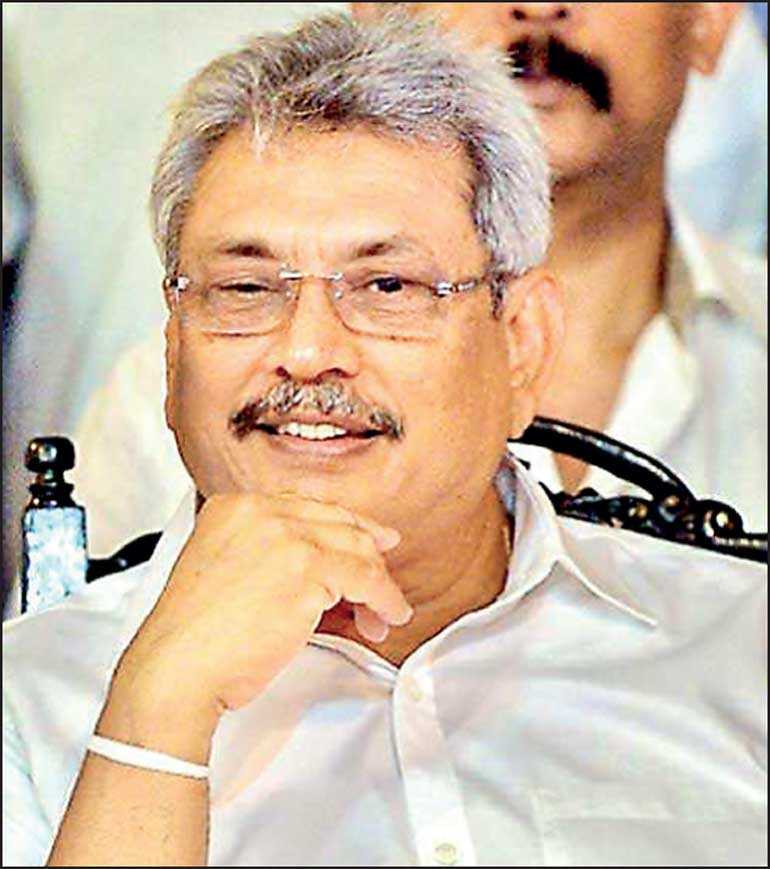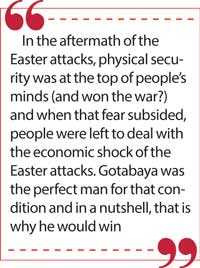Monday Feb 16, 2026
Monday Feb 16, 2026
Friday, 15 November 2019 00:00 - - {{hitsCtrl.values.hits}}

By VLM
In the final few days of the campaign trail, the usual talk is once again resurfacing. Apparently the NDF candidate is “picking up the pace” and “closing the gap”. This view isn’t without merit. The SLPP campaign definitely plateaued and with Sajith Premadasa claiming that he would “appoint a first-time PM”, there are definite steps towards the gap being narrowed. But the underlying story has not changed, and Sajith will have to do a lot more if he wants to beat Gotabaya Rajapaksa.
The story of 2015: A scapegoat for economic struggle
To understand why the 2019 election will go to the Rajapaksas, we need to look back at why it went away from them in 2015. In addition to both a re-energised UNP base that now thought its party genuinely could win as well as the support of an SLFP group that pledged loyalty to the party instead of to its then-mascot (read MR), the NDF benefitted from an upswell in support for the argument that the Rajapaksas were corrupt and authoritarian.
However, this was not a new argument. The UNP had been peddling this argument for almost a decade, but only now were they able to find traction. Why? The answer lies in the weakening economy. After the economic boom following the end of the civil war, the economy tanked. People started wondering: the war is over and the economy started growing, but I have no money now. Where is all the money? The easy answer that the NDF latched on to: The Rajapaksas stole it. That was why the argument of corruption touched the hearts of people.
Why wouldn’t it? When they were working overtime to feed their families, they hear of Namal Rajapaksa buying million-dollar cars. Regardless of whether they were true, stories like this were enough to hit hard and hit home. Abstract ideas of corruption and democracy would not matter so much to the average Sri Lankan, especially not against the ‘King’ who won the war. But personal struggles mattered. The vote swung. The Rajapaksas lost.
The lead-up to 2019: Bond scams and bomb scares
But before long, people started feeling that they had got it wrong. Sure, the economy expanded in 2015, helped a lot by the huge election giveaways of the 100-day program. But before long, the shade of corruption started spreading again. Once more, the Head of the Government was put at the forefront: Prime Minister Ranil Wickremesinghe was and still is a prime hand behind the bond scam in the people’s eyes. Put aside the fact that the loss to the Treasury was frozen off in Perpetual’s accounts or that there was some accountability. The official mandate that the NDF had was lost then and there.
Naturally, none of this really mattered just then, there was no election around and the economy was doing too well for people to feel more than a sense of patriotic anger. But the economy did not stay that way for long. The giveaways started losing their effect and the economy tanked once more.
Now, all the arguments about the Government ‘selling the country off’ and ‘stealing our money’ started having a more personal impact. Add to that the fact that the dysfunction between the President and the rest of the Government was making everything messy and the fact that the Government was in no way a ‘strong’ Government which could prevent almost weekly union action, and there was a clear story being built that ordinary people could get behind: my life is bad and the Government is the reason why.
The UNP got a respite in the aftermath of the 2018 constitutional crisis, with the economy sinking even further during that period and they now having someone else they could blame for it. But they did not capitalise on it at all (a General Election then would have been a good call), and then with the tragedy of Easter Sunday, lost all claim to a mandate. Not only did they feel that their lives were much worse, but now they had additional reason to distrust the fact that the Government would even keep them alive, and easily pinned the blame on the UNP. Anyone who made the decision to vote for the NDF in 2015 was now using pretty much the same logic to vote against them.
The 2019 election: The Gota phenomenon
These (primarily economic) factors alone would have made any candidate the SLPP put forward a formidable one. But who they put forward, and the time at which they did so, made it almost insurmountable.
In the aftermath of the Easter attacks, physical security was at the top of people’s minds (and who ‘won the war’?) and when that fear subsided, people were left to deal with the economic shock of the Easter attacks. Gotabaya was the perfect man for that condition and in a nutshell, that is why he would win.
But it goes deeper than that. Yes, the spectre of corruption and Rajapaksa authoritarianism still looms over the populace, which is what keeps the NDF afloat and also adds weight to all the third party candidates. But anyone who worried about that issue so much was either directly impacted by the Rajapaksas or too economically well off to feel the story that has been woven. In either case, they are not part of the swing and instead are within the UNP base.
Another factor is how Sajith is appealing to the rural populace of the country in a way that the UNP had not for almost two decades. But there is a reason that this appeal to rural Sri Lanka will not be enough to win him any further leeway. Simply because there are not as many voters there as he thinks. While the official census data says around 18% of Sri Lanka is urban, this is based on the definition of only urban councils and municipal councils being urban areas. A definition last updated in the 20th Century.
In reality, more Sri Lankans are urban than the data says. And that is without counting suburban regions that are clearly different from a rural area. All in all, the SLPP has a better chance in these areas, with Gotabaya’s policy platform aimed at telling these people that they can become richer with his policies, that he is a different effective leader and that he cares about opportunity more than giveaways. Sajith is still stuck giving out houses.
Conclusion: Close contest but Gotabaya wins
With all of this at play, there is no way that Gotabaya can lose this election. The urban and suburban vote of the country will go decisively to him, especially in the ethnically Sinhalese areas. While there might also be inroads made with minority communities, these will mostly be small and possibly even offset by gains that Sajith Premadasa will make with rural Sinhala Buddhist previously alienated by the pro-liberal UNP. This will make the race tight, but unless Sajith has somehow broken the Rajapaksa base and managed to woo suburban voters, he cannot pull ahead.
We will not actually know who won for sure until Monday at least, but in the end, the result will be clear. Close but in favour of Gotabaya Rajapaksa, the first President of the full 19th Amendment. The Yahapalana experiment will end, but despite the presidency (and probably the General Election after) going to the SLPP, we will still claim the experiment a success. Why? We’ll explain later.